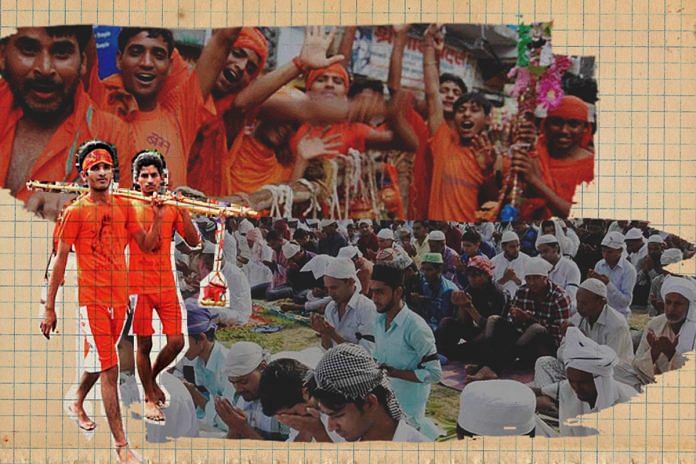During the month of sawan, kanwariyas (carriers of holy water) take to the streets for an annual Hindu procession that disrupts traffic and even leads to violence on the streets.
On the other hand, Muslims have faced severe criticism for praying in open spaces and using loudspeakers for azaan.
ThePrint asks- Kanwariyas vs Namazis: Double standard over disruption in public spaces?
Vicious plan to establish Hindu practices as cultural, Muslim as alien
 Apoorvanand
Apoorvanand
Hindi professor, Delhi University
Religion is a messy thing. It gets actualised through rituals of different kinds. Kanwar Yatra is one such ritual, which makes you a truer Shiva bhakt. By performing this ritual, your claim on Shiva becomes stronger and more authentic. It is futile to argue if it forms an essential part of Hinduism or Shiva bhakti.
Namazis can make similar argument about their Juma Namaz, performed collectively in an open or closed space. You can remain a true Muslim even without it but I cannot be stopped from believing that by doing this I am performing a true religious duty and cannot be deprived of it.
Modern sense of common space, regulation of its use through different laws came later. It can be said that Kanwar Yatra precedes modern roads, traffic regulations. Similarly, namazis can argue that by marking open, unoccupied spaces as sarkari and then making those out of bounds for the namazis violate their religious rights, which came much before the advent of modern lawful constraints.
It is seen that the roads, common spaces are taken over by the kanwariyas in the month of Shravan. It is seen as as natural. The administration takes it upon itself to facilitate the yatra. It is called culture.
Juma Namaz and the collective congregation of Muslims are seen as an unreasonable obstinacy on their part, which is said to be inherent to Islam. Such congregations are seen as extraneous to Islam. Related to this is the argument the Supreme Court is dealing with: What is at the core of Islam, what is essential to it?
There are two diametrically opposite approaches, which the state has adopted towards these two practices. The state is indulgent towards the natural cultural practice of Kanwar Yatra but it seeks to control and discipline the unnecessary collective namaz. To call it an instance of double standards is an understatement. It is an active political project. It is not a coincidence that since 2014, the kanwars are seen with the Tricolour.
Making this yatra part of the nationalist political project and stigmatising collective namaz as part of a nefarious design to usurp land go together. It is a cunning, vicious plan to establish that all Hindu practices are cultural and national while Muslim practices are a nuisance to public order and alien.
Read more: What defines Modi-ism? Politically potent racism against Indian Muslims
Kanwariyas slow down traffic sometimes, but can’t be compared with namazis
 Arun Anand
Arun Anand
CEO, Indraprastha Vishwa Samvad Kendra, and author of Know About RSS. Views expressed are personal.
Kanwariyas are devotees of Lord Shiva who travel barefoot for about two weeks carrying urns of water to pay obeisance to him. This journey is known as ‘Kanwar Yatra’.
It is an age-old tradition, but the number of kanwariyas has increased substantially after 1990s. Now, there is a heavy rush of kanwariyas on the Delhi-Haridwar highway during these two weeks. Their movement slows down the traffic at several places, but in no way can they be compared with those who want to squat in public spaces for namaz.
Kanwariyas take up this journey once in a year and that too for 15 days. Namazis want to do it every Friday. Kanwariyas generally don’t cause any disruption. We see them walking on pavements during the day and staying at makeshift camps, put up by devotees, at night. When Muslims sit on the roads and public places to offer namaz, the entire area comes to a halt.
Muslims have mosques where they should be offering the namaz whereas kanwariyas have to walk all the way and this journey is the soul of this age-old tradition.
Undoubtedly, some rowdy elements often mix up with the crowd of devotees. These elements are few in number, and should be discouraged and dealt with strictly if they try to cause disruption at public places.
This country has a longstanding tradition of ‘yatras’ in various forms, such as Rath Yatras (Jagannath Yatra is an example), Nagar Kirtans (a procession of Sikhs), Prabhat Pheri (morning yatras which were a part of our freedom movement and are still used for spiritual and social causes).
These traditional yatras, including the one undertaken by the kanwariyas, should be managed in a better way so as to cause least disruption. But, kanwariyas can in no way be compared with namazis.
If a procession disrupts rule of law, it must be seen as attack on collective freedom
 Hilal Ahmed
Hilal Ahmed
Associate professor, CSDS
Although there is a significant difference between Kanwariya procession and offering congressional prayers such as Friday afternoon namaz on public spaces, these religious activities pose a serious challenge to the Indian version of constitutional secularism.
Political theorist Rajeev Bhargava tells us that Indian secularism is based on the idea of “principled distance”, which means that the State would maintain a principled distance from all ‘religious activities’ on case to case basis, while recognising religious ceremonies as symbols of our shared and diversified cultural heritage.
Following this principle, two very clear arguments could be made.
1. Kanwariya processions as well as offering namaz must be recognised as crucial cultural expressions of religious kind. Therefore, our secular imagination should always provide a scope for such activities.
2. All religious-cultural activities are subject to public order and secular morality. Religious processions, in this sense, are to be planned, controlled and regulated to protect the collective secular/public interest. Hence, there is no harm in banning the Kanwariya procession and/or Namaz on roads if the public order is disrupted.
These two arguments, we must note, stress upon the nature of religious activity. If a particular form of procession does not affect the collective interest of citizens, it may be allowed on regulated basis. But if a procession goes out of control and starts disrupting the rule of law, it must be seen as an attack on the collective freedom that we enjoy as secular citizens.
The evocation of the principle of ‘principled distance’, in my view, may solve the puzzle of politically motivated ‘double standards’!
Why shouldn’t we use loudspeakers when we are praying to our gods?
 Rakesh Tanwar Gurjar
Rakesh Tanwar Gurjar
Member, Kanwariya Committee, Fatehpur Beri
I have been a kanwariya for the last 15 years. We have always received immense support from people on the road. They often provide us with juices, water, and even sweets. Whether it is Meerut, or Ghaziabad, people seem to enjoy the processions as much as we do.
Along with the kanwariya, supporters often travel in trucks. They play bhajans, mostly for Lord Shiva. People seem to enjoy that as well. We have never been told to lower the volume or accused of creating a ruckus. Why shouldn’t we use loudspeakers when we are praying to our gods? It shouldn’t matter if you’re Hindu or Muslim, you’re offering a prayer. It should not be an issue.
Yes, there are some stray elements. They do things that make us ashamed of the fact they are being clubbed with us. We do not endorse such behaviour. Overall, we are mostly devout and calm people.
The process is simple. Every year, the journey begins in the month of saawan. We go to Haridwar and collect the kanwar, and carry it all the way back to Delhi. The distance is about 300 km that we complete in a decided time frame.
Each kanwariya is usually headed to a temple in his own village. That is where we pour the holy water on the Shiv Linga.
We receive immense support from all communities. Even the Muslims in our village join us and feed us during the celebrations. Similarly, during the month of Ramzan, we break the fast with them.
Read more: A naked Jain monk spoke in Haryana assembly, but a Muslim can’t offer namaz in public?
State must be objective not political while enforcing laws
 Deeksha Bhardwaj
Deeksha Bhardwaj
Journalist, ThePrint
For the section of society that travels in cars, everything boils down to convenience — kanwarias, or namazis, or anyone blocking the road is a public nuisance.
In their view, Delhi anyway struggles with cases of road rage and accidents, and these processions only make matters worse.
For the rest, who are god-fearing people, such processions are a matter of faith. In the case of minorities, shouts of displeasure can push them back to their homes. Muslims are still fighting to have access to spaces to pray, and their case is pending in the Supreme Court.
However, these shouts of displeasure don’t deter the majority, who are Hindus in this case. They will brandish their swords and vandalise vehicles. They can afford to. There is a certain amount of complicity on part of the state when it comes to dominant religion.
Then, there is the secular argument of following the law. It matters not who creates the ruckus, these spaces are meant for the public, and must be used in a manner that is civilised. No one, however, cares for this argument.
In a country as polarised as India, whataboutery becomes the norm.
Once that happens, the argument degenerates into one that is less about the issue and more about the politics surrounding it. What we need to fix is the violence that accompanies any religious procession – manifesting physically or psychologically.
The Indian democracy is a peculiar state. Western secularism divorces the state from religion, but we don’t. If we can’t separate the two, then we must ensure followers of all religions have the freedom to express themselves, within reasonable restraints, of course.
When it comes to enforcement of laws, the onus is on the state to be objective, and not political.
Compiled by Deeksha Bhardwaj, journalist at ThePrint. You can reach her @deekbhardwaj on twitter.




Both lack civic sense.
It is correct that Hindu Yatra is limited for a few days , but namaz programme is daily five times every day.
Use of loud speakers should be banned in both cases and public rights be given top priority. Strict discipline be maintained in both the cases.
Personally I haven’t ever seen roads being blocked for namaaz, so can’t comment on it. Have seen traffic and civic life affected due to processions (both Hindu & Muslim) though. People who are concerned about civic life being affected due to religious events should demand better roads and traffic & civic administration. They could actually volunteer and help the administration in managing such events. People/organizations who are involved in/organize such events should also help the administration in managing by providing volunteers such that civic life is not disrupted due to their event. Special care must be taken so that emergency services are not at all hindered.
Are these authors/people who wrote in the article seriously dumb (or just acting) not to know the difference that : HINDU festivities/Yatras etc are for a day or short duration while the MUSLIM NAMAZ/AZAN is a DAILY TORTURE… That too EARLY MORNING…… How can you even compare the TWO ???
A country called Pakistan/ Bangladesh was created for islam to be practiced openly 5 times a day everyday. Please spare a thought for hindus who have to make space for secular faith of liberals every day
Why this question is only arising when there is BJP in UP, we never raised questions on people using loudspeaker 6 times a day before it was the BJP government. Both are equally wrong, but now only we realized it only because there is. BJP government, but before that there was no one asking the 6 times loudspeaker question.